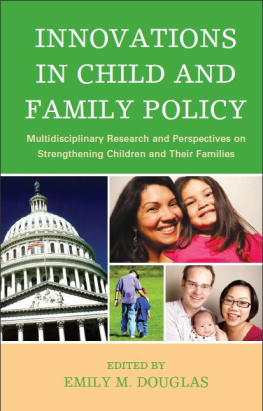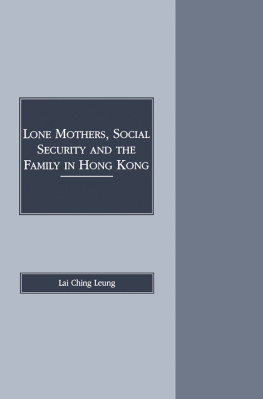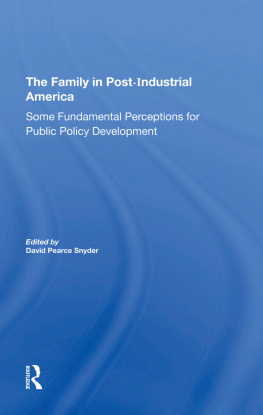
First published in Great Britain in 2012 by
The Policy Press
University of Bristol
Fourth Floor
Beacon House
Queens Road
Bristol BS8 1QU
UK
t: +44 (0)117 331 4054
f: +44 (0)117 331 4093
tpp-info@bristol.ac.uk
www.policypress.co.uk
North American office:
The Policy Press
c/o The University of Chicago Press
1427 East 60th Street
Chicago, IL 60637, USA
t: +1 773 702 7700
f: +1 773-702-9756
sales@press.uchicago.edu
www.press.uchicago.edu
The Policy Press 2012
British Library Cataloguing in Publication Data
A catalogue record for this book is available from the British Library.
Library of Congress Cataloging-in-Publication Data
A catalog record for this book has been requested.
ISBN 978 1 44730 053 3 paperback
ISBN 978 1 44730 052 6 hardcover
The right of Clem Henricson to be identified as author of this work has been asserted by her in accordance with the Copyright, Designs and Patents Act 1988.
All rights reserved: no part of this publication may be reproduced, stored in a retrieval system, or transmitted in any form or by any means, electronic, mechanical, photocopying, recording, or otherwise without the prior permission of The Policy Press.
The statements and opinions contained within this publication are solely those of the author and not of the University of Bristol or The Policy Press. The University of Bristol and The Policy Press disclaim responsibility for any injury to persons or property resulting from any material published in this publication.
The Policy Press works to counter discrimination on grounds of gender, race, disability, age and sexuality.
The Policy Press uses environmentally responsible print partners.
Cover design by Qube Design Associates, Bristol.
Front cover: image kindly supplied by istock.
Printed and bound in Great Britain by Hobbs, Southampton.
Contents
List of abbreviations
| ASBO | Anti-Social Behaviour Order |
| BBC | British Broadcasting Corporation |
| DCSF | Department for Children, Schools and Families |
| DfE | Department for Education |
| DfEE | Department for Education and Employment |
| DfES | Department for Education and Skills |
| DH | Department of Health |
| DWP | Department for Work and Pensions |
| EC | European Commission |
| EHRC | Equalities and Human Rights Commission |
| EU | European Union |
| Nacro | National Association for the Care and Resettlement of Offenders |
| NHS | National Health Service |
| OECD | Organisation for Economic Co-operation and Development |
| Ofsted | Office for Standards in Education, Childrens Services and Skills |
| ONS | Office for National Statistics |
| TUC | Trades Union Congress |
| UK | United Kingdom |
| UN | United Nations |
| US | United States |
| UK | WBG Womens Budget Group |
| UNCRC | United Nations Committee on the Rights of the Child |
About the author
Clem Henricson is a social policy analyst who has specialised in investigating the relationship between the state and the family on which she has published widely. She has a particular interest in human rights and has assessed family policy from a social rights perspective in The contractual culture and family services: A discussion , Government and parenting: Is there a case for a policy review and a parents code? and The child and family policy divide: Tensions, convergence and rights . She supervised the work of the Commission on Families and the Wellbeing of Children, and wrote its report Families and the state: Two-way support and responsibilities .
Clem Henricson was director of research and policy at the National Family and Parenting Institute for 10 years under the New Labour government, undertaking studies for the then Department for Children, Schools and Families, the Treasury, the Home Office and the Department of Health. She led a multidisciplinary academic team of developmental and social psychologists, and cultural and social policy analysts, and developed a model for the future of family services that was instrumental in shaping New Labours strategic planning in this area.
She now serves on international government and academic advisory committees concerned with family policy, and is a member of the Oxford Centre on Parenting and Children, honorary senior fellow at the University of East Anglia and a fellow of the Royal Society of Arts. She is currently writing a book on morality, tensions in the human psyche and public policy.
Acknowledgements
During the years of the New Labour government I had the good fortune to work in a national environment that was receptive to new ideas about family policy, and I owe a debt of gratitude to my colleagues at the National Family and Parenting Institute who brought their expertise to bear and worked with me in making a contribution to that debate. There were also many colleagues outside the Institute who were fellow travellers offering much kindness, support and intellectual insight to whom I am indebted. In particular, I should like to thank Andrew Bainham, Alan Deacon, Ilan Katz, Margaret OBrien, Simon Richey, Sir Michael Rutter, Susan Taylor, David Utting and Sir William Utting. I am also extremely grateful to Andrew Bainham and Alan Deacon for commenting so thoughtfully and helpfully on this book as it came to fruition.
ONE
Introduction
Moving into 2011/12, progressive politics finds itself at a strange juncture. Feelings of fin de sicle abound as a cadre of middle-way social improvers move out of influence following the end of the New Labour government and its replacement by a right of centre Coalition. Not only is there a change of elite, but also the slipping from view of a philosophy of government. And all this is happening at a time of economic crisis, lacing the experience with something of a sense of doom.
How should progressives react? First, before there is an irretrievable disappearance from collective memory, opportunities should be taken to review the decade of public policy under New Labour reflecting on the way it was, in order to inform the way it might be in the future.
What will this period of Labour administration be remembered for? On current form, it looks as though the financial crisis and foreign policy Iraq, Afghanistan will hold the headlines. The retrospective narrative as it currently stands, then, is a far cry from the sophisticated and wide-ranging political philosophy that was honed in opposition as a prelude to a decade of power. There was communitarianism, social capital, the reduction of child poverty and indeed a shift in family policy, which is the subject of this book. And that philosophy was not just hot air. It resulted in some very real achievements.
Well, exits are often accompanied by negative distortion, an uncomfortable aspect of the historical cycle. A further uncomfortable truth is that there are periods of fallow in progressive thinking, and it may be that there will be such a phase now. The direction of the current government does not give ground for optimism as it operates without a coherent philosophy, offering instead an ad hoc amalgam of social welfare contraction and civil libertarianism. Certainly there is no plotted articulated way forward for the future progressive agenda, and perhaps there cannot be until we have a fuller and more balanced retrospective assessment of the recent past.






